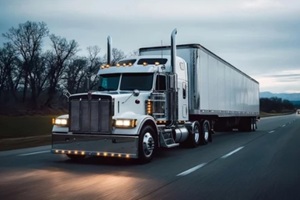
As an owner-operator in Virginia’s trucking industry, you’ve invested in your rig, established your routes, and committed to the open road. But have you secured the right insurance to protect your business? In the world of independent trucking, even a minor oversight can lead to major financial consequences.
Whether you’re a seasoned solo operator or just starting your journey as an owner-operator, juggling multiple roles – driver, dispatcher, mechanic, and accountant – requires careful planning and the right protection.
This guide covers the challenges specific to Virginia’s owner-operators, outlines the essential types of trucking coverage you need to consider, and provides expert tips to avoid common insurance pitfalls that can drain your time and money.
What Makes Owner-Operator Insurance So Complicated?
Being an owner-operator requires a new level of responsibility, especially as it relates to insurance. Here’s why:
You Wear Many Hats
As an owner-operator, you are responsible for many roles. This is especially true for those working in specialized segments, such as logging haulers, who often deal with rugged forest roads, variable loads, or seasonal contracts that require careful policy matching.
Coverage Depends on How You Operate
Are you leased to a carrier, or do you have your own authority? That distinction defines everything.
- If you are leased to a carrier, they may provide primary liability coverage while you are under dispatch, but not much else.
- If you are operating under your own authority, the insurance burden is entirely yours. This includes coverage for your liability, truck, cargo, and yourself.
Understanding which policies you need, at what amounts, and when is half the battle.
Essential Types of Insurance for Owner-Operators
As an owner-operator, you need to know what each policy does and whether it actually fits your day-to-day risks.
Here is a breakdown of the coverages that matter most, what they do, and when you need them.
Primary Liability
Liability insurance is mandatory if you operate under your own authority. This policy covers injury or damage to others while you are driving.
Non-Trucking Liability (Bobtail Insurance)
Non-trucking liability insurance kicks in when driving your truck without a load or not under dispatch. Logging haulers who deadhead out of forest sites may need this more than they realize.
Physical Damage
This policy covers damage to your truck due to an accident, fire, theft, or other incidents. Physical damage coverage is especially valuable for those hauling on rough or unpaved roads, such as those in the Shenandoah or Allegheny regions.
Cargo Insurance
Cargo insurance protects the freight you are hauling. Whether it is refrigerated goods, lumber, or raw timber, most shippers will not let you load without it.
Occupational Accident Coverage
Occupational accident insurance covers on-the-job injuries if you are not eligible for workers’ compensation. This coverage is indispensable for independent drivers, including equipment operators in the timber industry.
General Liability
General liability covers accidents that do not happen on the road but still involve your business. This could be a delivery where someone trips over your equipment, or you knock over a fence while backing into a yard.
Umbrella Coverage
Umbrella insurance covers lawsuits that go beyond your regular policy limits. It is especially beneficial for drivers hauling high-value freight, working under tight contracts, or operating in litigious environments.
Common Insurance Pitfalls Owner-Operators Should Avoid

When trying to get or stay on the road, it is tempting to obtain the most convenient and inexpensive insurance you can find. But that strategy can leave serious gaps in your protection and wallet.
Here are a few of the most common mistakes owner-operators make with insurance and how to avoid them:
1. Relying Too Much on the Carrier’s Policy
Just because your carrier offers coverage does not mean you are protected 24/7. For leased haulers in the timber industry, there is often a significant insurance gap when heading in or out of a job site.
2. Not Updating Coverage
If, for example, your routes change or you switch from regional runs to short-haul lumber transport, your risk profile changes as well. Therefore, you should update your policy to reflect this change.
3. Choosing the Cheapest Policy
Less expensive is not always better. The right policy will cover your truck, cargo, and future, not just your immediate cash flow.
4. Ignoring the Fine Print
Some policies exclude high-risk loads or have very specific requirements, such as GPS tracking in remote areas. Read the fine print to know precisely when and how you are covered.
Balancing Insurance Coverage and Affordability
Insurance costs can eat into your bottom line. And for owner-operators running on thin margins, every dollar matters. The trick is finding coverage that protects your business without blowing your budget. That starts with understanding what drives your premiums and knowing when to adjust.
What Drives Up Premiums?
Insurance companies do not pull premiums out of thin air. They consider a few main factors that significantly influence what you will pay, including:
- Your driving record
- The type of freight (e.g., timber, refrigerated, hazmat)
- Where you operate. Rates are typically higher if you operate on rural roads or steep mountain passes.
- The age and condition of your vehicle
Smart Ways to Save
Some drivers drop important coverages to lower their premiums. A better strategy is to make targeted adjustments, such as:
- Raising your deductible (if you have savings set aside)
- Bundling policies
- Looking for seasonal or part-time operation coverage, which is especially common in the logging industry.
Regulatory Requirements and Carrier Contracts
When you are an owner-operator, insurance provides more than protection; it also ensures compliance. The wrong policy (or missing paperwork) can get you sidelined quickly, especially during audits or when signing new contracts.
FMCSA Requirements vs. Real-World Coverage
The Federal Motor Carrier Safety Administration (FMCSA) sets the minimum insurance limits for anyone operating under their own authority. For most carriers, that means:
- $750,000 in primary liability (though many shippers require $1 million)
- Cargo insurance is not federally mandated, but brokers and logistics partners often require it.
Meeting the FMCSA’s minimums keeps your operation legal but does not guarantee full protection. Real-world freight contracts and customer demands often require higher limits or additional coverage, such as general liability or reefer breakdown coverage.
Carrier Contracts Can Be a Minefield

If you are leased to a carrier, you will usually need to provide a certificate of insurance (COI) showing proof of specific coverage types and limits. The contract might also require you to list the carrier as an additional insured or change your deductibles.
Do Not Let an Audit Shut You Down
Insurance is one of the first things auditors examine. If your policies do not match your filings or the terms of your contract, you risk fines, a drop in your safety rating, or even losing your authority.
Get Coverage That Keeps You Rolling With Burton & Company
Insurance for owner-operators should not be reduced to finding the lowest rate. It should be the kind of coverage that keeps you rolling, gets you through inspections, and does not fall apart when you need it most. Whether you are running general freight, specialized cargo, or forest-to-mill loads, getting the right coverage means you can focus on your operations.
For reliable insurance for owner-operators in Virginia, let Burton & Company get you on the road with confidence. Contact us today to request a free quote.

